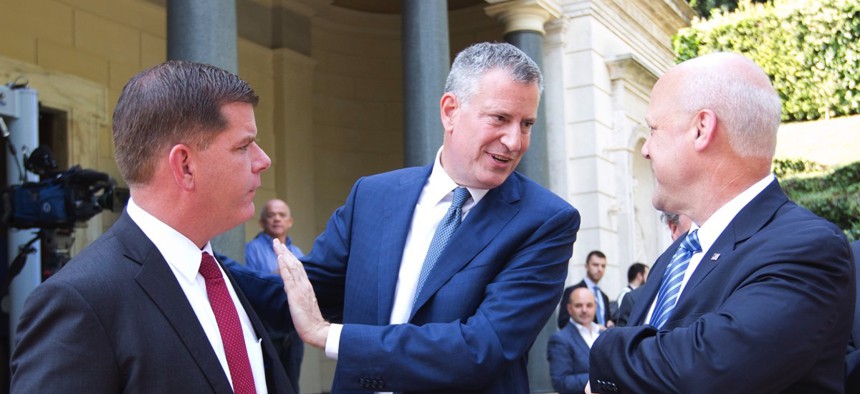Mayors to Congress: We Need to Be a Part of the ACA Conversation

Mayor Marty Walsh and Mayor Mitch Landrieu with Mayor Bill de Blasio, who has also been a vocal supporter of the Affordable Care Act. (AP Photo / Alessandra Tarantino)

Connecting state and local government leaders
“You’re going to hear from mayors loudly and clearly on these issues because we’re the ones that are going to have to deal with the people.”
Republican members of Congress aren’t having their most relaxing recess ever. News of one brutal town hall after another keeps trickling out as these lawmakers come face to face with voters who are both angry and anxious about the future of their health insurance.
In Metairie, Louisiana, U.S. Sen. Bill Cassidy, one of the only GOP members who has proposed an ACA replacement plan, was met by a room full of protesters, many of whom literally turned their back on the senator as he explained his plan via PowerPoint.
In rural Iowa, U.S. Sen. Chuck Grassley was confronted by constituents like Chris Petersen, a hog farmer, who spoke passionately on behalf of the Affordable Care Act. “If it wasn’t for Obamacare, we wouldn’t be able to afford insurance,” said Petersen.
Now, Boston Mayor Marty Walsh and New Orleans Mayor Mitch Landrieu have message for members of Congress on behalf of their fellow city executives: Don’t expect the mayors of America to remain silent as you debate the future the nation’s health care.
“We are going to be watching, we are going to be part of the conversation,” Mayor Walsh said on a Thursday conference call.
That call came of the heels of Wednesday’s “National Day of Action on Health Care” an event organized by the United States Conference of Mayors, in which more than 80 mayors from around the country participated—some in town hall forums, some by way of phone banks, and some on social media:
As Mayors Landrieu and Walsh see it, municipal leaders have no choice but to make their views known on these national issues. After all, senators and representatives may pass legislation, but it’s city officials who, as Landrieu put it, are either ‘left holding the bag or are being forced to deal with the consequences of whatever Congress enacts.”
“The mayors of America are standing up on a lot of issues, whether it’s public safety, infrastructure, immigration reform, and now health care,” Mayor Landrieu said on a Thursday’s call. “You’re going to hear from mayors loudly and clearly on these issues because we’re the ones that are going to have to deal with the people.”
“You need to have a sit-down and talk to us about some of our suggestions,” Walsh said, drawing from his experience as a legislator voting for universal health insurance in Massachusetts in 2004.
“There was truly a very deep conversation back then that I had with my constituents and we had with the city council and we had with the hospitals and with the business community. And I think that same type of conversation has to happen before the congress decides on a replacement.”
What They Stand to Lose
Mayors Walsh and Landrieu want Congress to understand first and foremost what their cities and greater regions stand to lose if the Affordable Care Act were to be repealed.
In Massachusetts, there are 395,000 residents who risk losing their health care coverage. 2.9 million Bay Staters have preexisting conditions. And, the commonwealth could be down $23 billion in federal funding, which Walsh pointed out, could have real consequences for medical research in a place that often leads the way in such innovation.
In New Orleans , Mayor Landrieu pointed to the 55 primary healthcare clinics that have been “supported by the financial mechanisms of the Affordable Care Act” that provide care to people who wouldn’t otherwise be able to afford their services. New Orleans isn’t the only place where the future of such clinics is in question.
What the Mayors Want
Mayors Landrieu and Walsh recognize that the Affordable Care Act isn’t perfect.
“Let us acknowledge that there are some parts of this health care act that did not perform as advertised,” Landrieu said. But that fact, the mayors maintain, does not necessitate a “repeal and replace” strategy.
“If there are things in the Affordable Care Act that don’t work, let’s fix them,” Landrieu said. “Don’t throw the baby out with the bath water.”
In the call on Thursday, and in an open letter submitted by the USCM, mayors are making it clear that there are five features of the ACA in particular that should remain no matter what congress decides:
- Insuring children up to the age of 26;
- Eliminating lifetime and annual limits;
- Assuring eligibility for insurance coverage even with pre-existing conditions;
- Guaranteeing coverage for pregnancy and breast cancer screenings; and,
- Providing coverage for preventive services at no additional cost
What the mayors certainly don’t want is a return to any policy that would kick health decisions down to the state level. Those are policies, that Landrieu said, force governors to make impossible decisions, decisions like “whether they’re going to pay for education or health care.”
“This notion of returning it to the states without the real financial safety net, this kind of you’re-on-your-own health care, is what caused most Americans to be uninsured many years ago,” Landrieu said.
Walsh closed the call with plea based on his experience in 2004.
“We should not return back to [being] a country where you have to live in New York or Massachusetts or Louisiana to have good quality health insurance.”
PREVIOUSLY on Route Fifty:
Quinn Libson is a Staff Correspondent for Government Executive's Route Fifty based in Washington, D.C.

NEXT STORY: Where State and Local Governments Are Upping Their Procurement





